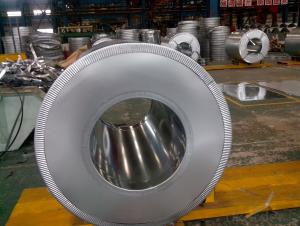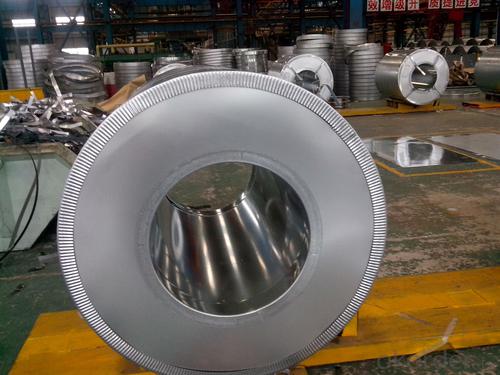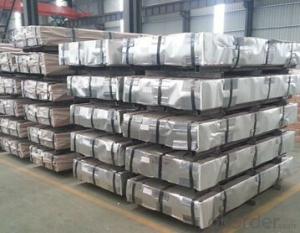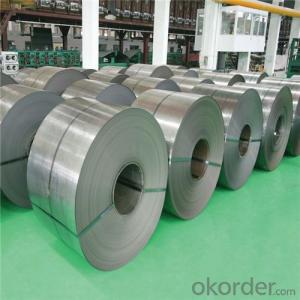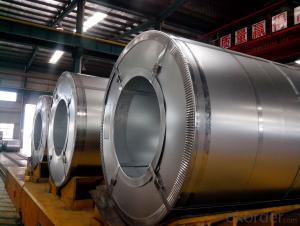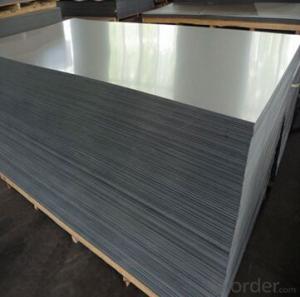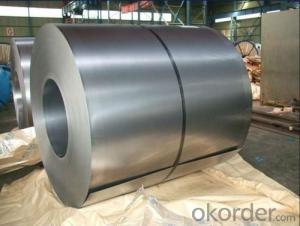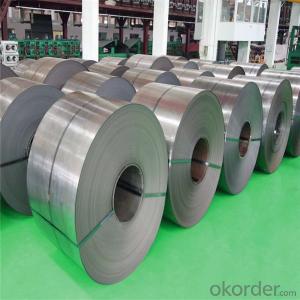Galvanized steel coil Z275 No spangle good quality
- Loading Port:
- Tianjin
- Payment Terms:
- TT OR LC
- Min Order Qty:
- 100 m.t.
- Supply Capability:
- 10000 m.t./month
OKorder Service Pledge
Quality Product, Order Online Tracking, Timely Delivery
OKorder Financial Service
Credit Rating, Credit Services, Credit Purchasing
You Might Also Like
The detailed information:
| Commodity | Hot dip galvanized steel coil and sheet |
| Techinical Standard: | JIS 3302 / ASTM A653 / EN10143 |
| Grade | DX51D / DX52D/ DX53D/ S250,280,320GD |
| Types: | Commercial / Drawing / Deep Drawing / Structural quality |
| Width | 500/650/726/820/914/1000/1200/1219/1220/1250mm |
| Thickness | 0.12-2.5mm (0.14-0.5mm is the most advantage thickness) |
| Type of coating: | galvanized |
| Zinc coating | Z60-275g/m2 |
| Surface treament | chromed / skinpass/ oiled/slightly oiled/ dry/ anti-fingerprint |
| Surface structure: | zero spangle / minimized spangle / regular spangle/ big spangle |
| ID coil | 508mm or 610mm |
| Coil weight | 3-8 MT per coil |
| Package: | Properly packed for ocean freight exportation in 20''containers |
| Application: | Industrial panels, roofing and siding for painting |
| Price terms | FOB,CFR,CIF |
| Payment terms | 30%TT in advance+70% TT or irrevocable 70%L/C at sight |
| delivery time | 25 days after recepit of 30% TT |
| Remarks | Insurance is all risks |
| MTC will be handed on with shipping documents | |
| We accept the third party certificatation test |
- Q: Where can you buy a steel polearm in a shop or if someone has a file in Scania than can you sell me one ill buy it for 150k my account is tonypark500
- you dont buy it, you earn it in the lottery cassandra was doing(it passed).
- Q: does anyone out there know where to get a good deal on a pedal steel guitar? i am from northern indiana and i'm willing to travel some if i have to.i am just getting into pedal steel guitar and i really don't have any idea what i need. i don't know how to play a guitar (i do know how to play the piano and the drums) at all but i want to learn to play the pedal stell guitar and i can't do that without getting one first so, if anyone can help me out i would greatly appreciate it! :o)
- Pedal steel guitars are a challenge to learn but they're a great instrument. More, even a starter pedal steel is going to run you $800 or so. Elderly Instruments in Lansing, Michigan sells a Carter brand starter pedal steel for $795 which is about as low as I've seen new ones. It has 3 foot pedals and 4 knee levers so it's nicely equipped. From northern Indiana it's not that far I would think. Good luck.
- Q: How are steel coils used in the manufacturing of garage doors?
- Steel coils are used in the manufacturing of garage doors as they provide the necessary strength and durability required for the door panels. These coils are formed into various shapes and sizes to create the panels, which are then coated and insulated to enhance their performance and appearance. The use of steel coils ensures that the garage doors are sturdy, long-lasting, and able to withstand the daily wear and tear associated with regular use.
- Q: How are steel coils used in the production of steel washers?
- Steel coils are used in the production of steel washers by being processed through a stamping or cutting machine. The coils are fed into the machine, which then cuts or punches out individual washer shapes. This process allows for efficient mass production of steel washers with consistent shape and size.
- Q: What are the main factors that affect the surface quality of steel coils?
- The main factors that affect the surface quality of steel coils include the quality of raw materials used, the manufacturing process employed, the level of cleanliness and maintenance of equipment, the presence of contaminants or impurities, the coating or finishing applied, and the handling and storage conditions.
- Q: How do steel coils contribute to the manufacturing of electrical appliances?
- Steel coils are essential components in the manufacturing of electrical appliances as they are used to create the core of transformers and electromagnets. These coils, made from steel, provide the necessary magnetic field required for the functioning of electrical appliances such as refrigerators, televisions, and washing machines.
- Q: What are the environmental impacts of steel coil production?
- The environmental impacts of steel coil production include emissions of greenhouse gases, such as carbon dioxide, during the process of extracting and processing raw materials like iron ore and coal. Additionally, the production of steel coils requires a significant amount of energy, contributing to the depletion of natural resources and increased carbon emissions. The wastewater generated during steel production can also contain pollutants, which may harm aquatic ecosystems if not properly treated. Furthermore, the disposal of steel coil waste, such as slag and other by-products, can pose challenges in terms of proper handling and potential contamination of soil and water sources. Overall, steel coil production has substantial environmental impacts that demand sustainable practices and mitigation measures.
- Q: How are steel coils used in the production of fireproof doors?
- Steel coils are used in the production of fireproof doors as they provide the necessary strength and durability to withstand high temperatures and prevent the spread of fire. The coils are formed into sheets or plates, which are then used to construct the framework and core of the fireproof doors. This ensures that the doors can effectively resist fire and protect buildings and occupants from its dangers.
- Q: What are the common coil defects and their causes?
- Some common coil defects include edge wave, center buckle, oil canning, and coil breaks. These defects can occur due to various causes such as improper tension during the coiling process, uneven cooling, material defects, or inadequate lubrication.
- Q: What brand steel tapes are of good quality?
- Durable durable depends on your personal use frequency, the high frequency nature is easy to wear, resulting in scale. If you like fuzzy units if buying tape need verification it is best to buy the Great Wall Seiko goods, because the time to measure the number of verification inspection of steel tape, basically qualified rate of the Great Wall Seiko steel tape can reach one hundred percent.
Send your message to us
Galvanized steel coil Z275 No spangle good quality
- Loading Port:
- Tianjin
- Payment Terms:
- TT OR LC
- Min Order Qty:
- 100 m.t.
- Supply Capability:
- 10000 m.t./month
OKorder Service Pledge
Quality Product, Order Online Tracking, Timely Delivery
OKorder Financial Service
Credit Rating, Credit Services, Credit Purchasing
Similar products
Hot products
Hot Searches
Related keywords
